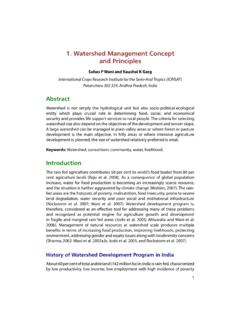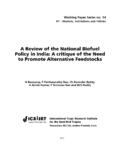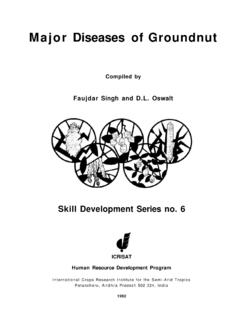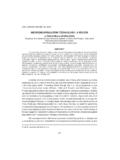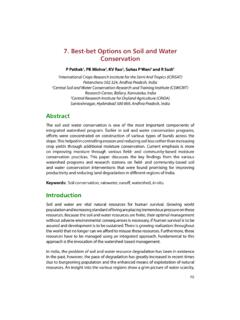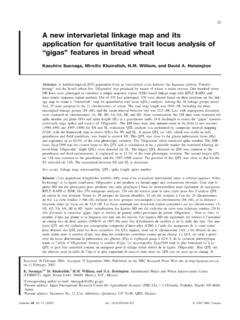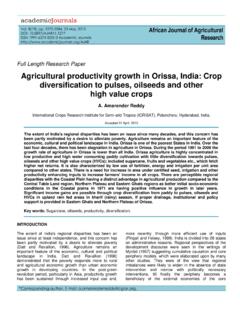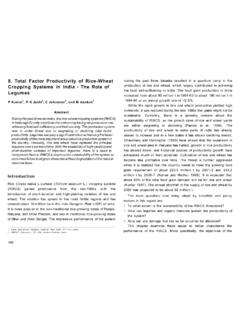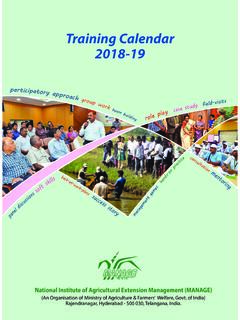Transcription of Andhra Pradesh Farmer Producer Organisations Promotion ...
1 Rythu Kosam Andhra Pradesh Farmer Producer Organisations Promotion Policy 2016. Operational Guidelines Government of Andhra Pradesh Hyderabad August 2016. Rythu Kosam Andhra Pradesh Farmer Producer Organisations Promotion Policy 2016. Operational Guidelines CONTENTS. 1. 2. 3. 4. Guiding 5. Guidelines for sustaining FPO's ..2. 6. Institutional 7. Government Departments-District Level ..5. 8. FPO Promoting 9. Farmer Producer Organizations/ Farmer Producer 10. Project Support 11. Synergies with existing Institutions of 12. Financial 13. Budget 14. 15. 16. 17. 18. Andhra Pradesh Farmer Producer Organisations Promotion Policy 2016. Operational Guidelines 1. Preamble The government of Andhra Pradesh aspires to bring together 10 lakh farmers through 1,000 FPOs in the state with an objective to maintain a leadership position in India across the primary sector.
2 This requires transformational interventions with necessary participation of all stakeholders. The following document is a step towards the same. The collectivization of producers, specifically marginal and small farm holders into producers' organizations is emerging as the effective possible pathway to address improved access to investments, technologies, knowledge support, inputs and markets. The Government of Andhra Pradesh has identified Farmer Producer Organizations (FPOs) as the appropriate institutional form around which farmers would be mobilized and their collective capacity of production and marketing can be leveraged by strengthening their capacities. The formation and development of FPOs will be actively encouraged and supported by the Government of Andhra Pradesh and their agencies, using financial resources from various centrally-sponsored and state-funded schemes along with resources mobilized from the financial institutions.
3 This Operational Guidelines document is a reference guide for line departments and development agencies which seek to promote and support Farmer Producer Organizations. 2. Definition A Farmer Producer Organization (FPO) is typically a society/company consisting of only practicing farmers who are also actual producers of a specified commodity/. commodities, and is formed under the Mutually Aided Cooperative Societies (MACS). Act 1995 or as a Farmers Producer Company (FPC) under the Companies Act 2013. These organizations are created at the cluster, block, district or state level depending upon the needs of the producers considering the demand potential to adopt value chain approach to enhance farmers'/producers' economic and social benefits. 3. Scope The provisions of these guidelines will apply to existing FPOs already registered under the Mutually Aided Cooperative Societies (MACS) Act 1995, FPC under the Companies Act 2013 and under various central and state cooperative society laws and those FPOs/FPCs that will be registered subsequent to the issue of these policy guidelines.
4 1. 4. Guiding Principles The typical FPOs/FPCs may have 500 to 1000 members. In case of special circumstances (tribal regions, commodity specific needs), the number of members in a FPO/FPC could be either less than 500 or more than 1000 if their aggregate volumes are suitable for a business model. The legal status of the entity should enable business/trading/other commercial activities including value chain development that generate additional income to the members. These entities could also be nested institutions , cooperatives (under MACS) at primary level becoming members/shareholders of a FPO/FPC, at apex level/ federation level. Increasing benefits to the members (enhancing income through technology and knowledge infusion, higher productivity and business services like input distribution, output marketing, value addition, accounts management and administration/others) is the fundamental requirement/purpose for establishing FPOs/FPCs.
5 The FPO/FPCs is a business entity with a detailed business plan as well as share capital from all the members who are actual farmers producing a specified commodity/commodities. FPOs/FPCs have to be established in the context of existing and emerging market opportunities that they could potentially access in future. Based on a systematic assessment of market potential, business plans of FPOs/FPCs have to be developed professionally. The timeline for Promotion and sustainable establishment of an FPO/FPC shall be limited to 3-5 years. On-going efforts by departments, NGOs and other agencies should be consolidated and further strengthened by converging necessary support systems at district and state level. FPOs/FPCs will focus on (a) improving productivity through improved extension services; (b) use of appropriate technology and knowledge systems; (c) creating infrastructure facilities for improved efficiency in pre and post harvest production systems; (d) reduce cost of production; (e) creating business opportunities that generate higher incomes.
6 2. 5. Guidelines for sustaining FPOs/FPCs Based on the above principles, a set of guidelines by which FPOs/FPCs will put these into practice are outlined below;. Voluntary and open membership to all farmers/producers is mandatory. Use the services and willingness to accept membership without social, gender, racial, political or religious discrimination. It is desirable that the policies within FPO/FPC are formulated by active participation of all Farmer members through democratic decision making. Farmer -member economic participation should be ensured through equitable contribution and democratic control of the capital of their FPO/FPC. A part of the capital shall be used to create the common property of the FPO/FPC for the purpose of members. Autonomy and independence of FPOs/FPCs is controlled by Farmer -members only and no non-members can be associated as member for the FPOs/FPCs.
7 The elected body will comprise of members representing different commodity producers in case the FPO/FPC handles more than one commodity. It would be desirable to ensure equitable gender participation for effective functioning. Irrespective of the number of shares held by the member, voting right will be limited to one from each family. Training and capacity building for Farmer members should be actively taken up. Cooperation among FPOs/FPCs working through local, regional, national and international organizations need to be promoted. The FPOs/FPCs may be federated at district/state or any other appropriate level. FPOs/FPCs should work for sustainable development of their communities through policies approved by their members. 6. Institutional Arrangements The role/responsibilities and functions of the different agencies at state, district, FPO/FPC level are briefly mentioned below: Advisory Board A group of experts would be functioning as Advisory Board.
8 This board would meet once every quarter to provide guidance, feedback and direction to the agenda. Advisory board will be constituted at state level consisting of government officials, academia, and representatives from industry, NGOs and farmers. 3. Government Departments State Level The following departments/agencies are part of FPO/FPC development (i). Department of Agriculture and Cooperation; (ii) Department of Animal Husbandry; (iii) Commissionerate of Fisheries; (iv) Commissionerate of Horticulture; (v) Society for Elimination of Rural Poverty; (vi) AP State Cooperative Marketing Federation; (vii) Andhra Pradesh Food Processing Society; (viii) any other agencies. Project Management Units: As a part of facilitating the formation of FPOs/FPCs, each department will take up the following responsibilities Establish a Project Management Unit (PMU) within each department at Commissionerate/directorate level.
9 This PMU will have at least two members with required professional competencies in following areas: a) business development; b) institution development; c) capacity building; d) production technologies; e) project management. One of the two members should be a senior officer from the department concerned. Commissioner of the respective department would be the chair of the PMU. The PMU will be supported by Project Support Unit (PSU) for strengthening FPO. agenda at the state level, assisted by ICRISAT-led consortium of organizations like Basix, Vrutti, WASSAN, etc. PMU will develop department specific strategies, action plans and targets for promoting FPOs/FPCs related to its jurisdiction ( , Identification of products/. crops and related geographies; identification of potential numbers of FPOs/FPCs, etc.
10 PMU will act as a project incubation unit where in FPO's/FPC's can be linked to corporates. This includes a) Identifying crops and interventions required to improve productivity b) Identifying suitable corporate partner for value chain development and market linkage. c) Evaluation and approval of PPP proposals submitted by corporate/FPC's. d) Channelizing of funds from govt/FPO's /FPC's/financial institutions and other agencies e) Monitoring project implementation timelines and deliverables. f) Evaluation of completed projects and documentation. Channelize and integrate available funds/ programs/ schemes of the department towards strengthening/ supporting of FPOs/FPCs ( , capacity building; provision of infrastructure facilities; demonstration of new technologies, risk coverage, and mechanization, etc.

